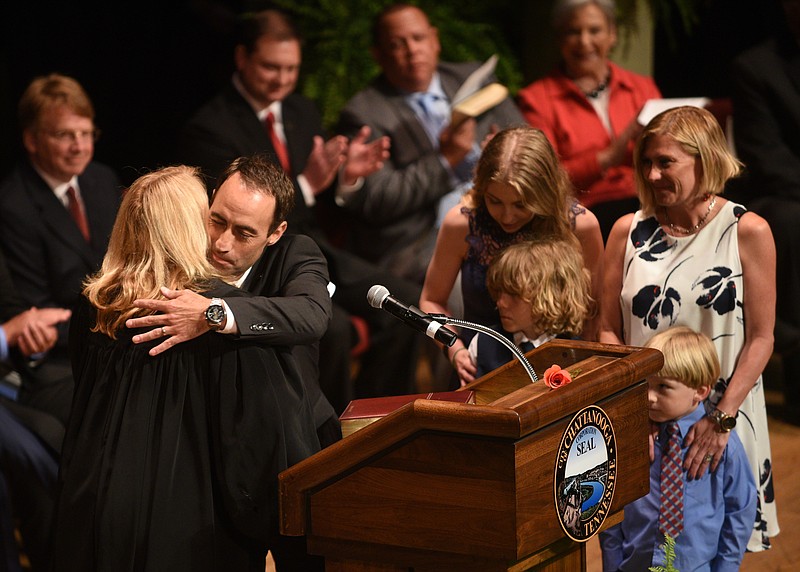If Greg Martin is tapped for state seat
Ken Smith, the District 3 Chattanooga city councilman, has declared that if the Hamilton County Commission appoints Commissioner Greg Martin to the open District 26 state House seat later this month, he would seek the open commission seat.
Martin is one of three candidates who have applied with the commission for the House appointment. Whether or not he is appointed, he plans to seek the GOP nomination for the post in the August state primary.
The others who have applied for the appointment are David Swinford, who also has picked up papers to run in the GOP primary, and Shannon Stephenson, chief executive officer of Cempa Community Care, who said she would be seeking just the temporary appointment.
Smith is currently in his third term on the city council and following his 2017 re-election had been mentioned as a potential mayoral candidate in 2021. However, he did not run.
Should the commission seat become vacant with Martin's appointment, and the current council vice chairman be appointed to the seat, he would become only the second person since both the city and county adopted new forms of government in the late 1980s and late 1970s, respectively, to move from the council to the commission.
The first was William Cotton, who served one term on the city council (1990-1993). He was elected to the county commission in 1998, re-elected in 2002 but resigned in 2006 in the wake of a conviction on federal bribery charges.
UTC grad to make Congress try?
Tres Wittum, who attended Cleveland High School, graduated from University of Tennessee at Chattanooga and has been a policy and research analyst for the Tennessee state Senate Finance, Ways and Means Committee, told the Tennessee Star he plans to make an announcement about his entry in the Republican primary race for the 5th District U.S. House seat during the first week of April.
Before joining the state Senate staff, he was a policy and research analyst from 2011 to 2017 for state Sen. Bo Watson, R-Hixson, who was speaker pro tempore for the Senate at the time.
Wittum said he's been in the exploratory stage, talking to business leaders and voters. He already had picked up papers to explore qualifying for the seat.
The seat is currently held by U.S. Rep. Jim Cooper, D-Nashville, who chose to retire when the Republican-dominated state legislature drew new districts that made it more difficult for him to win re-election following the 2020 census.
The 5th District GOP primary already has a slew of declared candidates, including former Tennessee Speaker of the House Beth Harwell, former Brig. Gen. Kurt Winstead, Natisha Brooks, Baxter Lee, California native Robby Starbuck, D.C. insider Morgan Ortagus, New York native David Vitalli, and Stewart Parks. Others are said to be considering the race.
Wittum also was the campaign manager for Watson's 2018 re-election race and briefly was chairman of the Davidson County Republican Party in 2017.
Education weights for county
The Tennessee Investment in Student Achievement (TISA) formula is the new funding mechanism that has been proposed by Tennessee Gov. Bill Lee to replace the Basic Education Program (BEP) in allocating state money for K-12 public school districts.
The new formula is said to be a "student-based" approach that calculates the cost of an adequate K-12 education by giving extra weight to certain student- and district-level characteristics.
The Sycamore Institute, a Nashville-based public policy research center, has published a dashboard on some of the metrics of how the per-pupil formula, if it is adopted, would be determined in each county.
In Hamilton County, as for every district across the state, the base amount would be $6,860 per pupil. But that would increase based on a number of characteristics, including a weight of 5% for not being a small district, 5% for not being a sparse district, 25% for having 35.5% economically disadvantaged students, 5% for having 65.9% students living in concentrated poverty, between 20% and 70% for having 9.9% students with limited English proficiency, between 15% and 150% for having 12.8% of students with other unique learning needs and 4% for having 3.7% charter school students.
Among the listed characteristics, Hamilton County ranks in the top 10 of the state only for the most charter school students (third).
The funding formula, currently being debated in the legislature, if passed, would begin with the 2023-2024 school year.
